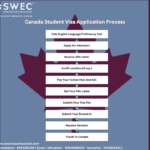Table of Contents
Canada is known for its high quality of life, excellent education system, and strong healthcare infrastructure, making it one of the most family-friendly countries in the world. Many immigrants choose Canada not just for personal growth but also to ensure a better future for their loved ones.
Understanding the importance of family unity, the Canadian government has developed various immigration policies to help families stay together. One of the key initiatives supporting family reunification is the Canada Dependent Visa, which allows eligible sponsors to bring their family members to live with them in Canada.
In this article, we will explore the Canada Dependent Visa, its significance, who can sponsor dependents, and the different types of dependent visas available.
Key Takeaways:
✔ Meet financial and legal requirements before applying.
✔ Submit complete and accurate documents to avoid delays.
✔ Provide strong proof of relationship to strengthen your case.
✔ Track your application and respond to IRCC requests promptly.
✔ Seek expert guidance from SWEC Visa to maximize your approval chances.
What Is A Canada Dependent Visa?
A Canada Dependent Visa is a category of visa that enables Canadian citizens, permanent residents (PRs), and some temporary residents to bring their dependents to Canada. This visa allows families to live together and provides dependents with access to education, healthcare, and, in some cases, work opportunities.
Who Can Sponsor Dependents?
The following individuals are eligible to sponsor dependents under the Canada Dependent Visa program:
- Canadian Citizens and Permanent Residents: Can sponsor spouses, common-law partners, dependent children, parents, and grandparents.
- Temporary Residents (Work or Study Permit Holders): Can bring their spouse and children, but under different visa categories (spousal open work permit, study permits for children, etc.).
Benefits of Bringing Dependents to Canada
Bringing family members to Canada offers numerous benefits, such as:
- Stronger Family Bonds: Families can stay together and support each other while building a future in Canada.
- Educational Opportunities: Dependent children can access Canada’s excellent education system.
- Healthcare Access: Dependents may be eligible for Canada’s healthcare system, depending on the province.
- Work Opportunities for Spouses: Spouses or common-law partners of certain visa holders can apply for an open work permit.
- Pathway to Permanent Residency: Certain dependent visas allow family members to apply for PR in the future.
Types Of Canada Dependent Visas
Canada offers different dependent visa categories to accommodate various family relationships. Below are the key types:
1. Spouse or Common-Law Partner Visa
This visa allows Canadian citizens and permanent residents to sponsor their spouse or common-law partner to live with them in Canada.
Eligibility Criteria:
- The sponsor must be a Canadian citizen or permanent resident.
- The sponsor must be at least 18 years old.
- The relationship must be legally recognized (marriage certificate or proof of common-law status).
- The sponsor must not be bankrupt or have a criminal record.
Sponsorship Requirements:
- Proof of a genuine relationship (marriage certificate, joint bank accounts, photos, communication history, etc.).
- Commitment to financially support the spouse for a certain period (typically three years).
- The sponsored spouse cannot sponsor another partner for five years after gaining PR.
Rights and Benefits:
- The spouse or partner can apply for an open work permit and work for any employer.
- Eligibility for permanent residency.
- Access to healthcare and social benefits.
2. Dependent Child Visa
This visa allows Canadian citizens, PRs, and certain temporary residents to bring their dependent children to Canada.
Who Qualifies as a Dependent Child?
- Children under 22 years old who are not married or in a common-law relationship.
- Children over 22 who have a mental or physical condition preventing them from being financially independent.
Eligibility and Application Process:
- Proof of parent-child relationship (birth certificate, adoption papers, etc.).
- Financial proof shows the sponsor can support the child.
- Medical and background checks for the child.
- Children can study in Canada with a study permit.
3. Parent and Grandparent Super Visa
This visa is designed for parents and grandparents of Canadian citizens and PRs who want to visit their family in Canada for extended periods.
Difference Between Super Visa and PR Sponsorship:
- Super Visa: Temporary, valid for up to 10 years, allows multiple entries.
- Parent and Grandparent Sponsorship: Grants permanent residency but has a long processing time.
Duration, Eligibility, and Application Process:
- Allows parents and grandparents to stay in Canada for up to 5 years per visit.
- The sponsor must meet a minimum income requirement.
- Proof of private health insurance for at least one year.
- Medical examination and biometrics are required.
- Application is processed faster than PR sponsorship.
4. Other Family Sponsorships
Orphaned Relatives
- Canadian citizens and PRs can sponsor orphaned siblings, nephews, nieces, or grandchildren if they are under 18, unmarried, and have no parents alive.
Adopted Children
- Canadians can sponsor a child they legally adopted outside Canada.
- The adoption must meet both Canadian and the child’s home country’s legal requirements.
- The immigration process includes extensive documentation and background checks.
Eligibility Criteria For Sponsors
Sponsoring a dependent for a Canada visa comes with specific requirements. The sponsor must meet certain conditions to ensure they can provide financial and emotional support to their dependents.
Who Can Sponsor?
The following individuals are eligible to sponsor a dependent for a Canada Dependent Visa:
- Canadian citizens (living in Canada or planning to return upon approval of sponsorship)
- Permanent residents (PR holders) residing in Canada
- Temporary residents (work permit holders or study permit holders) can apply for a dependent visa for their spouse or children
Minimum Income Requirements
- Sponsors applying for a Parent and Grandparent Super Visa need to meet the Minimum Necessary Income (MNI) requirement. This is based on family size and must be proven with tax records.
- There is no specific income requirement for spousal or child sponsorship, but sponsors must prove financial stability to support dependents.
Obligations of the Sponsor
- Sign an undertaking agreement to provide financial support to the dependent for a certain period.
- Ensure the dependent does not rely on social assistance from the Canadian government.
- Be responsible for basic needs, such as food, housing, and healthcare (if not covered by provincial plans).
- For spouse sponsorship, the undertaking period is three years; for children, it can be up to 10 years or until they turn 22.
Who Cannot Sponsor a Dependent?
Certain individuals are ineligible to sponsor dependents, including:
- Those who failed to support a previously sponsored dependent financially
- Individuals with a criminal record (involving violent or sexual crimes)
- Those declared bankrupt (not yet discharged)
- People receiving government social assistance (except for disability)
- Sponsors who were previously sponsored as a spouse and became PR less than five years ago
Eligibility Criteria For Dependents
Dependents must also meet specific requirements to qualify for a Canada Dependent Visa.
Relationship Proof
- Spouse/Common-law Partner: Marriage certificate or proof of at least one year of cohabitation
- Children: Birth certificate or legal adoption papers
- Parents/Grandparents: Relationship proof through a birth certificate or other official documents
Financial Dependency Proof (for Children)
- Children must be under 22 years old and unmarried
- If over 22, they must have a physical or mental condition making them financially dependent on their parents.
Health and Security Requirements
- Dependents must undergo a medical examination to prove they are free from serious health conditions that may burden Canada’s healthcare system.m
- Must pass security and background checks (criminal record, past immigration violations, etc.)
Age Restrictions for Children
- Only children under 22 years qualify unless they have a lifelong dependency due to a medical condition.
- If a dependent turns 22 during application processing, they remain eligible if they were already dependent at the time of application.
Canada Dependent Visa Application Process
Applying for a Canada Dependent Visa involves multiple steps, from verifying eligibility to visa approval.
Step 1: Check Eligibility and Gather Documents
Applicants must collect the necessary documents, such as:
- Identity proofs (passport, national ID)
- Financial records (proof of funds, tax assessments)
- Relationship evidence (marriage certificates, birth certificates, communication history)
Step 2: Submit an Application
- Applications can be submitted online (through IRCC’s portal) or via a paper-based application
- Sponsorship approval process:
- The sponsor submits a sponsorship application
- Once approved, the dependent submits their visa application
- IRCC assesses eligibility and documentation
Step 3: Pay Visa Fees
Visa fees vary based on the category of dependents:
- Spouse or partner sponsorship: CAD 1,080 (including sponsorship, processing, and Right of Permanent Residence Fee)
- Dependent child sponsorship: CAD 150 per child
- Parent/Grandparent Super Visa: CAD 100 (biometric fees may apply)
Step 4: Medical Examination and Biometrics
- All dependents must undergo a medical examination conducted by an IRCC-approved physician
- Biometric appointment is mandatory for applicants aged 14-79 (includes fingerprinting and photo)
Step 5: Wait for Processing & Updates
- Processing times vary depending on the type of application:
- Spousal Sponsorship: 12-18 months
- Child Sponsorship: 6-12 months
- Parent/Grandparent Super Visa: 4-8 months
- Applicants can track their application via the IRCC portal
Step 6: Receive Approval and Travel to Canada
- Once approved, dependents receive a Confirmation of Permanent Residence (COPR) or visa stamp
- Next steps:
- Spouses and partners may receive an Open Work Permit
- Dependent children can study in Canada without a separate study permit
- Parents and grandparents can visit Canada for up to 5 years per entry under a Super Visa
Processing Time And Fees
Average Processing Time for Each Category
The time taken to process a Canada Dependent Visa depends on the type of dependent and other factors. The approximate processing times are:
- Spousal/Common-law Partner Sponsorship (PR Holder or Citizen Sponsoring) – 12 to 18 months
- Spousal/Common-law Partner Sponsorship (Work/Study Permit Holders Sponsoring) – 6 to 12 months
- Dependent Child Visa – 6 to 12 months
- Parent and Grandparent Super Visa – 4 to 8 months
Factors That Affect Processing Speed
Several factors can impact the processing time of dependent visa applications:
- Completeness of Documentation – Applications with missing or incorrect documents may face delays.
- IRCC Backlogs – A high volume of applications may slow down processing.
- Sponsorship Eligibility Issues – If the sponsor does not meet financial or legal requirements, it can cause delays.
- Medical and Security Checks – If additional health or background checks are needed, the process may take longer.
- Country of Application – Processing times vary depending on the visa office handling the application.
Detailed Fee Breakdown
Canada Dependent Visa fees vary by category. Below is a detailed breakdown of costs:
Spouse or Common-law Partner Sponsorship (PR Holder or Citizen Sponsoring)
- Sponsorship Fee: CAD 75
- Principal Applicant Processing Fee: CAD 490
- Right of Permanent Residence Fee (RPRF): CAD 515
- Biometric Fees (if applicable): CAD 85
Dependent Child Sponsorship
- Processing Fee (per child): CAD 150
- Biometric Fees (if applicable): CAD 85
Parent and Grandparent Super Visa
- Application Processing Fee: CAD 100
- Biometric Fees (if applicable): CAD 85
- Mandatory Medical Insurance Cost: CAD 1,000 – 2,000 per year (varies based on age and insurance provider)
Note: Some fees may be waived for certain applications. Always check the latest IRCC fee structure before applying.
Rights And Benefits Of Dependents In Canada
Once approved, dependents in Canada enjoy several rights and benefits depending on their category.
For Spouses/Common-law Partners
- Work Permit Eligibility – Spouses of Canadian PR holders, citizens, or work permit holders can apply for an Open Work Permit (OWP), allowing them to work for any employer.
- Pathway to Permanent Residency (PR) – Spouses sponsored by a PR holder or citizen can apply for PR directly. Those on a work permit can transition to PR via programs like Express Entry or the Provincial Nominee Program (PNP).
- Access to Healthcare – Eligible for provincial health insurance after fulfilling residency requirements.
For Dependent Children
- Free Public Education – Children of PR holders and work permit holders can access free primary and secondary education in Canada.
- Health Benefits – Eligible for public healthcare coverage, including doctor visits and emergency care.
- Future PR Opportunities – Dependent children can transition to PR through family sponsorship or by applying under study/work visa categories.
For Parents and Grandparents (Super Visa Holders)
- Extended Stay in Canada – The Super Visa allows parents and grandparents to stay in Canada for up to 5 years per visit, with multiple entries valid for 10 years.
- Healthcare Options – While not covered under public healthcare, Super Visa holders must have private health insurance to cover medical expenses in Canada.
Tip: Sponsors should explore provincial healthcare programs and private insurance options to ensure dependents get the best medical coverage.
Common Reasons For Visa Rejection And How To Avoid Them
Despite meeting eligibility criteria, many dependent visa applications get rejected due to common errors. Below are key reasons for rejection and ways to avoid them.
1. Incomplete or Incorrect Documentation
❌ Reason: Missing or inaccurate details in the application form or supporting documents.
✅ How to Avoid:
- Double-check that all forms are accurately filled out.
- Submit translated copies if documents are in a language other than English or French.
- Provide clear and valid identity proofs (passports, birth/marriage certificates, etc.).
2. Insufficient Proof of Relationship
❌ Reason: IRCC rejects applications where the relationship between the sponsor and dependent is not properly established.
✅ How to Avoid:
- For spouse sponsorship, provide marriage certificates, wedding photos, joint bank accounts, and communication records.
- For dependent children, submit birth certificates and financial dependency proof (if applicable).
- For parents/grandparents, provide legal proof of relationship (birth certificate or family register).
3. Sponsor’s Ineligibility (Financial, Legal Issues)
❌ Reason: The sponsor fails to meet financial requirements or has legal restrictions (criminal record, pending bankruptcy, etc.).
✅ How to Avoid:
- Ensure minimum income requirements are met (for parent/grandparent sponsorship).
- Have a clean financial and legal record.
- If financial eligibility is an issue, consider co-sponsoring with a family member.
4. Medical or Security Inadmissibility
❌ Reason:
- The dependent has serious health issues that may burden Canada’s healthcare system.
- The applicant has a criminal record or prior immigration violations.
✅ How to Avoid: - Undergo the medical exam with an IRCC-approved panel physician before applying.
- Submit all required police clearance certificates to prove no criminal background.
- If medical inadmissibility is a concern, consult an immigration expert like SWEC to explore alternative options.
Final Tip: Hiring a professional immigration consultant, like SWEC Visa, can significantly reduce the risk of errors and rejection!
Tips For A Successful Canada Dependent Visa Application
Applying for a Canada Dependent Visa requires careful preparation. Follow these key tips to maximize your chances of approval and avoid unnecessary delays.
1. Ensure All Documents Are Accurate and Complete
- Double-check all application forms for errors or missing details.
- Submit clear, valid copies of passports, identity proofs, and other required documents.
- If documents are in a language other than English or French, provide certified translations.
2. Meet Financial Requirements Before Applying
- Sponsors must meet the minimum income requirement (especially for parent/grandparent sponsorship).
- Provide bank statements, employment letters, and tax returns to prove financial stability.
- Ensure no outstanding loans, bankruptcy, or financial ineligibility issues exist.
3. Submit Strong Proof of Relationship
- For spouses/common-law partners, submit:
✔ Marriage certificates
✔ Wedding photos
✔ Joint bank accounts or property ownership
✔ Communication records (chats, emails, call logs) - For dependent children, provide:
✔ Birth certificates
✔ Proof of financial dependency (if over 18) - For parents/grandparents, submit:
✔ Legal proof of relationship (family register, birth certificate)
4. Keep Track of Processing Updates
- After submission, monitor the application status regularly through the IRCC website.
- Respond to IRCC requests quickly if additional documents or information are needed.
- Be aware of processing times to avoid delays and plan travel accordingly.
5. Seek Professional Guidance If Needed
- If unsure about documentation, consult an immigration expert to avoid mistakes.
- Professional consultants like SWEC Visa can provide tailored guidance and improve approval chances.
How SWEC Visa Can Help You
At SWEC Visa, we specialize in Canada Dependent Visa applications and ensure a smooth and hassle-free process for reuniting families.
1. Expertise in Canada Dependent Visa Applications
- Our experienced immigration consultants understand the latest visa rules and requirements.
- We provide personalized assistance based on your specific situation.
2. Assistance with Documentation and Application Filing
- We review your application to ensure accuracy and completeness.
- Our team helps you gather strong relationship proof to avoid visa rejection.
- We handle paperwork and submission efficiently to minimize delays.
3. Guidance on Improving Approval Chances
- We assess your financial eligibility and provide solutions if requirements are not met.
- If any legal or medical issues exist, we guide you on how to address them properly.
- We offer support in case of previous visa rejections, ensuring a stronger reapplication.
4. Post-arrival support for Dependents
- Assistance with health insurance, work permits, and other settlement needs.
- Guidance on PR pathways for eligible spouses and dependents.
- Help with finding education, healthcare, and job opportunities in Canada.
Conclusion
Reuniting with family in Canada is a life-changing opportunity, and the Canada Dependent Visa allows you to bring your loved ones together under the same roof.
Don’t take risks with your family’s future!
Consult SWEC’s professional visa and immigration experts today for a smooth and successful Canada Dependent Visa application!






